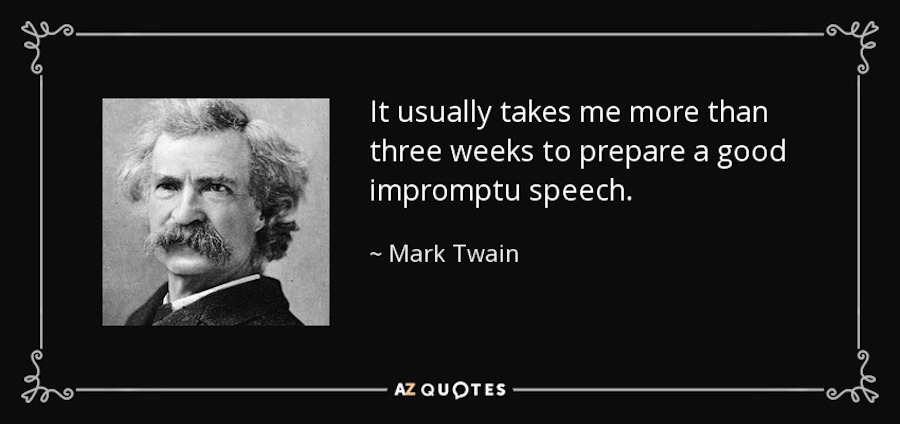Have you ever had to give a speech or present in front of a group of people and felt your palms sweat, your heart race, and your stomach churn? Do you find yourself avoiding opportunities to speak in public altogether? You’re not alone.
Public speaking is a common fear for many people, but have you ever stopped to wonder why it’s so hard? In this blog post, we’ll be exploring the 7 main reasons why public speaking is such a daunting task for so many of us. Whether you’re a seasoned public speaker or someone who avoids it altogether, this post will shed some light on the science behind why public speaking can feel so challenging and provide some tips for overcoming these obstacles.
Additional reading: Is public speaking really more feared than death?
Table of Contents
1. Fear of failure
Public speaking is a difficult task for many, and fear of failure is one of the main reasons why people struggle with it. For example, past experiences with public speaking that didn’t go well can present new challenges and create anxiety about speaking in front of an audience again.
This fear can be exacerbated by the constant worry of repeating past mistakes. If not addressed, this fear can grow and become a phobia that inhibits personal and professional growth. Moving past these negative experiences and reflecting on them is crucial to overcome this fear.
Failure should be seen as an opportunity to learn and grow, rather than as a hindrance to progress.
A lack of confidence or belief in one’s public speaking abilities can also make it challenging to give a speech. It is natural to doubt oneself, but constantly thinking negatively can lead to a self-fulfilling prophecy of failure. It is essential to recognize one’s strengths and use them to build self-confidence. Additionally, preparation and rehearsal can help ensure a successful delivery and boost confidence.
Furthermore, building a foundation on the wrong public speaking approach can also make it hard for you to deliver a successful speech. Often, people are taught strategies that may not work for them, or they may try to imitate speakers whose style does not align with their own. This can lead to feelings of inadequacy and self-doubt. It is essential to find a public speaking approach that works for one’s unique strengths and personality. This will help build confidence and make public speaking a less daunting task.
Additional reading: How to overcome stage fright: 7 effective and proven tips
2. Fear of Making the Same Mistakes Again
As I mentioned in previous chapter, past experiences with public speaking that did not go as planned can lead to a lack of confidence and self-doubt. Reminiscing about a bad or embarrassing moment on stage can perpetuate the fear of public speaking, making it challenging to move forward. Unfortunately, this type of anxiety can be difficult to overcome, and it can affect your personal and professional life, leading to missed opportunities if left unchecked.
To fully move past a bad public speaking experience, reflecting on the situation is vital.
- Recognizing what caused the negative experience and accepting that failure is a natural part of the learning process can help you let go of past mistakes.
- Accepting that failure is part of the process of success and that mistakes can help you to grow personally and professionally is essential.
- Accepting the fear and working on confidence-building strategies, such as practicing with familiar people, visualizing success, or deep breathing exercises, can help to reduce stress and overcome any past negative experiences.
Moreover, public speaking anxiety can get worse when you keep replaying the negative event in your mind. It is important to remember that every speech and presentation is a new opportunity to succeed, and each experience is different from the other. You should prepare thoroughly, adequately research their topic, and practice delivering their speech.
By doing this, you will gain confidence, and the fear of repeating past mistakes or experiencing an undesirable outcome on stage will reduce.
With a positive mindset and the right approach, past experiences can become less of a hindrance and more of a building block in improving public speaking skills.
Additional reading: 7 good public speaking tips you should use: A helpful guide
3. Focus on the Judgments of Others
Another reason why people struggle with public speaking is due to unfounded or unrealistic fears about audience judgment. Speakers often worry that their audience will judge them or their message harshly or allow for the opinions and judgments of their audience, making them feel helpless and nervous.
Recommended books
While it’s important to become aware of the fact that each individual will have an opinion, it’s also essential to accept these opinions positively, whether good or bad. Changing one’s perspective is also a healthier approach to dealing with negative feedback.
Instead of focusing on whether the audience enjoyed the speech or not, speakers should turn their attention to their contribution and the value they added to the content. This strategy helps eliminate the pressure from the audience’s judgments and shifts the focus to self-improvement and progress.
As long as speakers have a positive attitude and a higher level of self-efficacy, they can overcome their fears and become effective public speakers.
However, this fear is usually not based on any factual evidence and can impede one’s ability to deliver a speech with confidence.
It is important to remember that the audience is there to learn or be informed, and they are on your side.
Understanding this can help reduce the anxiety associated with public speaking.
Additional reading: Stage fright: A Helpful Illustrated Guide
4. High expectations
High expectations play a major role in making public speaking seem difficult for even the most experienced speakers. These expectations could come from various sources, such as:
- the audience,
- the speaker themselves,
- or the context in which the speech is being delivered.
Having a high level of expectation can be overwhelming for some individuals, as it could mean delivering a flawless speech, or being an engaging orator. When expectations are high, it makes it difficult for the you to feel confident and relaxed, which are crucial factors for successful public speaking.
It’s important to manage your expectations and set achievable goals that align with your level of experience and skillset.
This approach can help reduce the pressure and anxieties associated with public speaking, and help you build their confidence gradually.
Additional reading: 33 tips to improve your presentation skills: A Helpful Guide
5. Lack of Confidence or Belief in Your Abilities
This insecurity can manifest in many different ways, such as:
- feeling too nervous to speak up in front of a group,
- doubting that your ideas are valuable,
- or worrying about what others might think of you.
Ultimately, when someone lacks confidence in themselves and their speaking capabilities, it becomes much more challenging to deliver a clear and compelling message to an audience.
One way to combat this lack of confidence is to practice speaking regularly. As with any skill, the more you speak in public, the more confident you’ll become. Additionally, seeking feedback and constructive criticism from others can be incredibly helpful in identifying areas for improvement and building self-assurance.
It’s also important to remember that everyone makes mistakes and experiences setbacks from time to time. Rather than dwelling on perceived failures, you can use them as opportunities to learn and grow.
Overcoming these fears requires a shift in mindset, recognizing that not everyone will agree with or accept every idea put forth, and that’s okay. By focusing on the value of their message and how it can benefit the audience, you can gain confidence in their ability to deliver impactful presentations.
Additional reading: How to speak with confidence in public?
6. Lack of Preparation or Rehearsal
Not spending enough time practicing the speech can lead to a lot of anxiety and nervousness. Without preparation, you cannot fully grasp the content and the flow of the speech, leading to stumbling or forgetting important points.
Rehearsal gives the speaker ample room for improvement, and it also helps them build confidence and reduce their anxiety.
Practicing in front of friends or colleagues can also help the speaker get feedback and work on your presentation style. A lack of preparation or rehearsal not only affects the your confidence but also affects your credibility and performance.
Therefore, it’s essential to set aside enough time to research, prepare and rehearse the speech, regardless of its length or content.
Additional reading: 6 great methods to improve public speaking skills
7. Unfounded Fears About Audience Opinion
Another common cause of low confidence in public speaking is a fear that their audience will not understand or appreciate what you have to say, or that you’ll be perceived as incompetent or unintelligent.
Many individuals have unfounded or unrealistic fears about what their audience members will think of them.
This fear can be related to past experiences where they may have received negative feedback.
To overcome this fear, you need to focus on your message and the reasons why you are delivering it. You should also remember that your audience is there to hear you speak because you most likely have something valuable to say.
Additional reading: Public speaking FAQs: Answers To the Top 22 Most Common Questions
To sum it up
It’s important to note that everyone has different fears and anxieties when it comes to public speaking. Therefore, it’s important to acknowledge your fears and address them accordingly. With practice and perseverance, everyone can overcome their fears and become more confident in their public speaking abilities. The key is to maintain a positive mindset, focus on the message being delivered, and embrace the opportunity to connect with and engage the audience.
In conclusion, public speaking is hard for many reasons, including a fear of failure, unfounded fears about audience judgment, building on the wrong foundation, a lack of confidence or belief in one’s abilities, and a lack of preparation or rehearsal. Overcoming these difficulties requires reflection, positive thinking, and finding the right approach for individual needs. With time, practice, and a positive mindset, anyone can become a successful public speaker.













